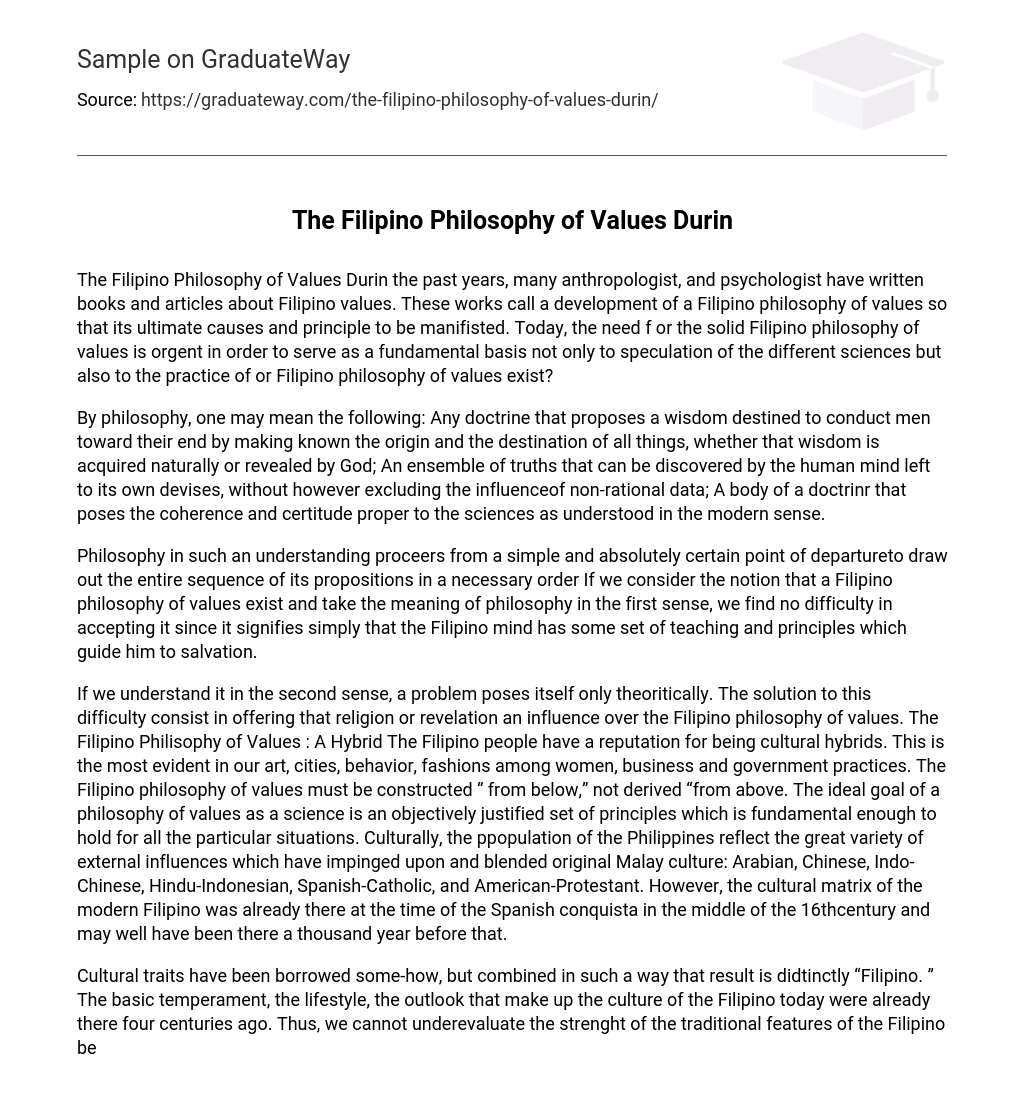The Filipino Philosophy of Values Durin the past years, many anthropologist, and psychologist have written books and articles about Filipino values. These works call a development of a Filipino philosophy of values so that its ultimate causes and principle to be manifisted. Today, the need f or the solid Filipino philosophy of values is orgent in order to serve as a fundamental basis not only to speculation of the different sciences but also to the practice of or Filipino philosophy of values exist?
By philosophy, one may mean the following: Any doctrine that proposes a wisdom destined to conduct men toward their end by making known the origin and the destination of all things, whether that wisdom is acquired naturally or revealed by God; An ensemble of truths that can be discovered by the human mind left to its own devises, without however excluding the influenceof non-rational data; A body of a doctrinr that poses the coherence and certitude proper to the sciences as understood in the modern sense.
Philosophy in such an understanding proceers from a simple and absolutely certain point of departureto draw out the entire sequence of its propositions in a necessary order If we consider the notion that a Filipino philosophy of values exist and take the meaning of philosophy in the first sense, we find no difficulty in accepting it since it signifies simply that the Filipino mind has some set of teaching and principles which guide him to salvation.
If we understand it in the second sense, a problem poses itself only theoritically. The solution to this difficulty consist in offering that religion or revelation an influence over the Filipino philosophy of values. The Filipino Philisophy of Values : A Hybrid The Filipino people have a reputation for being cultural hybrids. This is the most evident in our art, cities, behavior, fashions among women, business and government practices. The Filipino philosophy of values must be constructed “ from below,” not derived “from above. The ideal goal of a philosophy of values as a science is an objectively justified set of principles which is fundamental enough to hold for all the particular situations. Culturally, the ppopulation of the Philippines reflect the great variety of external influences which have impinged upon and blended original Malay culture: Arabian, Chinese, Indo-Chinese, Hindu-Indonesian, Spanish-Catholic, and American-Protestant. However, the cultural matrix of the modern Filipino was already there at the time of the Spanish conquista in the middle of the 16thcentury and may well have been there a thousand year before that.
Cultural traits have been borrowed some-how, but combined in such a way that result is didtinctly “Filipino. ” The basic temperament, the lifestyle, the outlook that make up the culture of the Filipino today were already there four centuries ago. Thus, we cannot underevaluate the strenght of the traditional features of the Filipino behavior and beliefs. The lineal village, the strong family unit, the kinship relationship extended throught marriage and leadership, the authority vested on family heads and elders were all existent even before the Western contact.
Historically, the Philippines has drunk from the fount of three physical and cultural words- the Asian, the Pacific, and the Occidental. The Filipino traditional culture moreover is a synthesis of three mainsteams-the Malay which in itself is a hybrid, the Chinese Mind, and the Indian art. The stucture of communal life, native and imported ceramicart behavioral patterns, beliefs and values are evidence of this. What is Filipino? The Filipno is all these and more!
The Filipno is the imponderable unity and uniqueness of diverse races, richness, and idiosyncracies. The Filipino is the legacy of the multi-racial humanity. The Filipino is the monument of the Malays, the Spaniards, the American, the Japanese, the Chinese, the Hindus, the Dutch, and the Englishman all united into one. The Filipino is the Christian formed by Spain who has a centralized government, the Roman Law, and Latin alphabet. The Filipino is the Chinese who knows the art of mining, metallurgy gun-powder making, porcelain, and pottery production.
The Filipino is the American who drinks beer, plays basketball, has democratic temperament and public school system, speak English, and sees hollywood films. Yet prior to all of this, the Filipino is the Malay who had a village government ruled by a oral and written laws promulgated by the datu, recognized a supreme being and lesser deities in his animo-deist religion, used juices, herbs and oils for medical purposes, and was expert in carvings and handicrafts industries.
Today, the Filipino is the Filipino who himself, a Malay-Indonesia negrito distilled with European and American cultures and races; an individual well-gifted in friendship, understanding, letters, arts and sciences, sports and pursuit of exellence; a Christian gentleman; an avid lover of democracy; and a personality graduallyy discovering his identity. The Filipino is all these and more!
More, because he can develop the tallents and innate qualities and he can surpass the legacies of his ancestors and predecessors. But he can never renounce the European and American cultural and racial legacies in him. They are in flesh and blood. They are part of his being. To renounce them means to renounce a part of his own identity or personality. The Filipino is Asian but he is also European. The Filipino is Oriental but he is also Occidental. He cannot be entirely eastern; he is also western.





